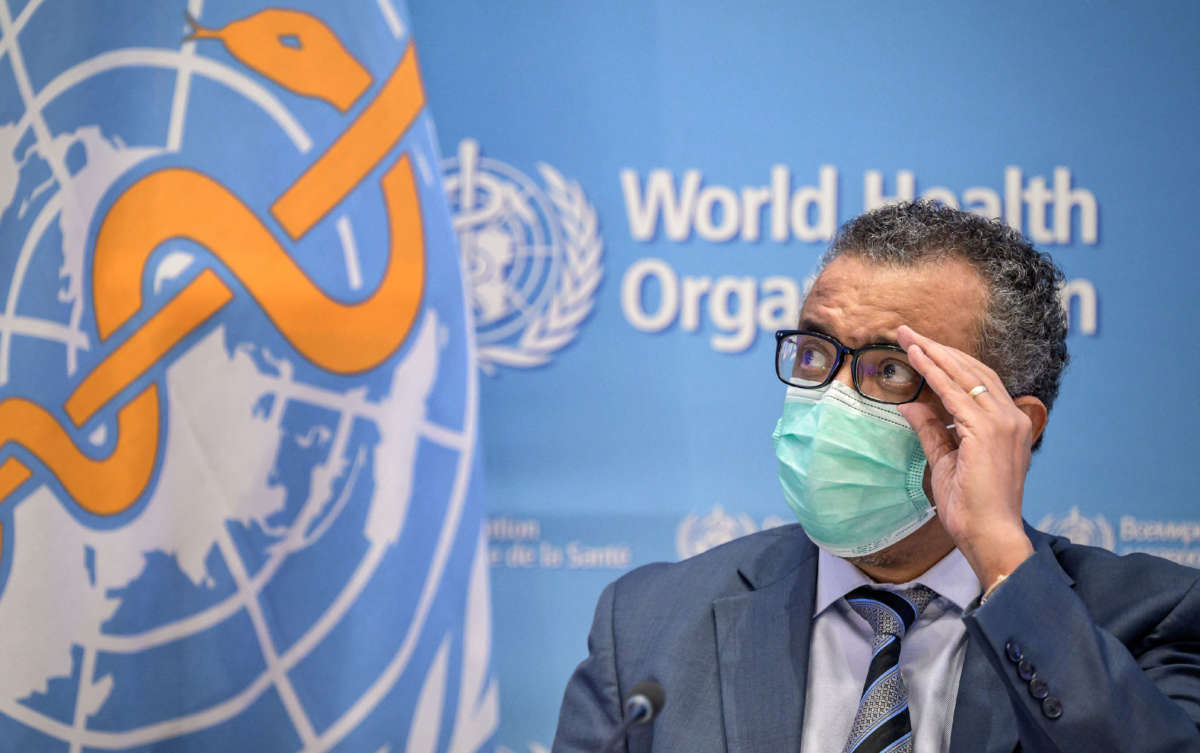The head of the World Health Organization delivered a stark warning Monday about the state of the coronavirus pandemic as the highly transmissible Omicron strain continued to rip through large swaths of the global population, posing the greatest threat to poor countries that have been denied access to vaccines.
“There is now consistent evidence that Omicron is spreading significantly faster than the Delta variant,” WHO Director-General Tedros Adhanom Ghebreyesus said during a media briefing, referring to the previously dominant Covid-19 strain. “And it is more likely that people who have been vaccinated or have recovered from Covid-19 could be infected or reinfected.”
Tedros voiced particular concern about the collision of Omicron and crowded holiday celebrations, which he said “will lead to increased cases, overwhelmed health systems, and more deaths.”
“More than 3.3 million people have lost their lives to Covid-19 this year — more deaths than from HIV, malaria, and tuberculosis combined in 2020,” Tedros noted. “And still, Covid-19 continues to claim around 50 000 lives every week. That’s not to mention the unreported deaths and the millions of excess deaths caused by disruptions to essential health services.”
“All of us are sick of this pandemic. All of us want to spend time with friends and family. All of us want to get back to normal,” he continued. “The fastest way to do that is for all of us — leaders and individuals — to make the difficult decisions that must be made to protect ourselves and others. In some cases, that will mean canceling or delaying events… But an event canceled is better than a life canceled.”
“An event canceled is better than a life canceled.”
WHO Director General @DrTedros recommends canceling holiday plans as omicron spreads pic.twitter.com/uo1UOIkxRu
— Bloomberg Quicktake (@Quicktake) December 20, 2021
The Omicron strain now accounts for nearly three-quarters of all new coronavirus cases in the United States, and recorded infections stemming from the variant are doubling every two to three days in the dozens of countries where its presence has been detected.
“Africa is now facing a steep wave of infections, driven largely by the Omicron variant,” Tedros observed Monday. “Just a month ago, Africa was reporting its lowest number of cases in 18 months. Last week, it reported the fourth-highest number of cases in a single week so far.”
Reiterating his condemnation of vaccine apartheid — which has left billions without access to lifesaving shots as rich nations swallow up much of the world’s supply — Tedros said that “if we are to end the pandemic in the coming year, we must end inequity by ensuring 70% of the population of every country is vaccinated by the middle of next year.”
The WHO warned last week that, over a year and a half into the pandemic, more than 40 countries have been unable to vaccinate at least 10% of their populations and nearly 100 countries have not reached the 40% threshold.
Overall, according to Our World in Data, just 7.6% of people in low-income nations have received at least one coronavirus vaccine dose.
Omicron’s rapid spread in the month since it was first detected by South African scientists has led some European countries to impose new public health restrictions to stem surging cases.
In the U.S., the Biden administration is planning to distribute 500 million free at-home coronavirus testing kits to households and send federal medical personnel to overwhelmed hospitals as part of its efforts to combat Omicron. President Joe Biden officially announced those new components of his Omicron plan in a speech Tuesday.
“This is not a speech about locking the country down,” White House Press Secretary Jen Psaki, who previously dismissed the idea of mass-mailing free Covid-19 tests to U.S. households, told reporters Monday. “This is a speech outlining and being direct and clear with the American people about the benefits of being vaccinated, the steps we’re going to take to increase access and to increase testing, and the risks posed to unvaccinated individuals.”
While early data out of South Africa has sparked some cautious optimism that Omicron causes less severe disease than other coronavirus variants, public health experts have warned that a massive spike in infections could swamp hospitals that are already at capacity, particularly in developing nations.
“It is probably unwise to sit back and think this is a mild variant, it’s not going to cause severe disease, because I think with the numbers going up all health systems are going to be under strain,” Soumya Swaminathan, the WHO’s chief scientist, told journalists Monday.
Additionally, though preliminary research indicates that existing coronavirus vaccines are effective at preventing serious illness or death from Omicron, lack of vaccine access in poor countries could allow the strain to run rampant across much of the world, causing more deaths and potentially spawning new variants.
Join us in defending the truth before it’s too late
The future of independent journalism is uncertain, and the consequences of losing it are too grave to ignore. To ensure Truthout remains safe, strong, and free, we need to raise $46,000 in the next 7 days. Every dollar raised goes directly toward the costs of producing news you can trust.
Please give what you can — because by supporting us with a tax-deductible donation, you’re not just preserving a source of news, you’re helping to safeguard what’s left of our democracy.
